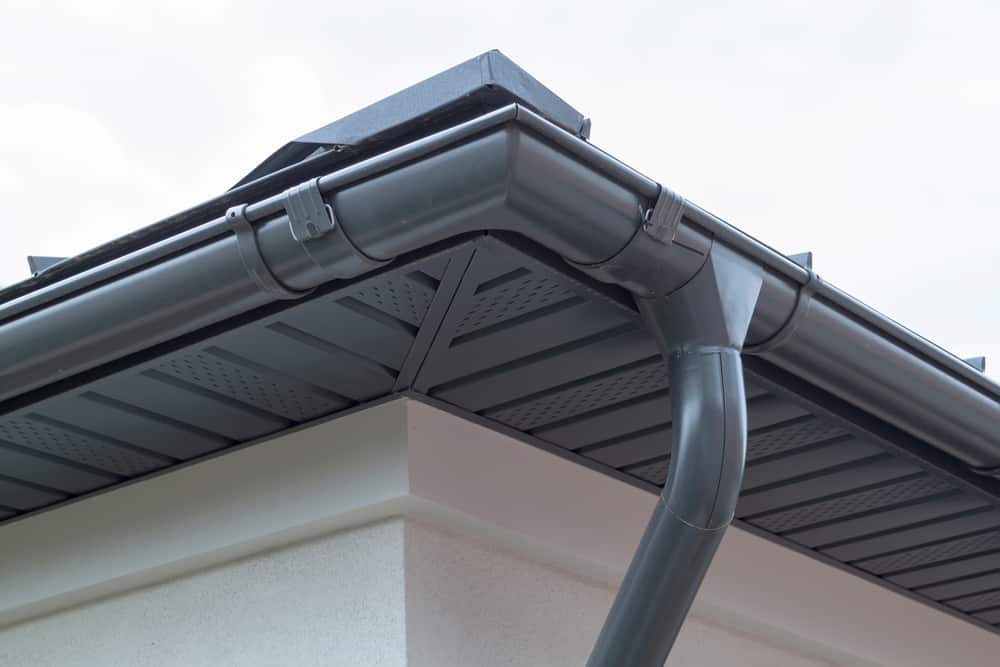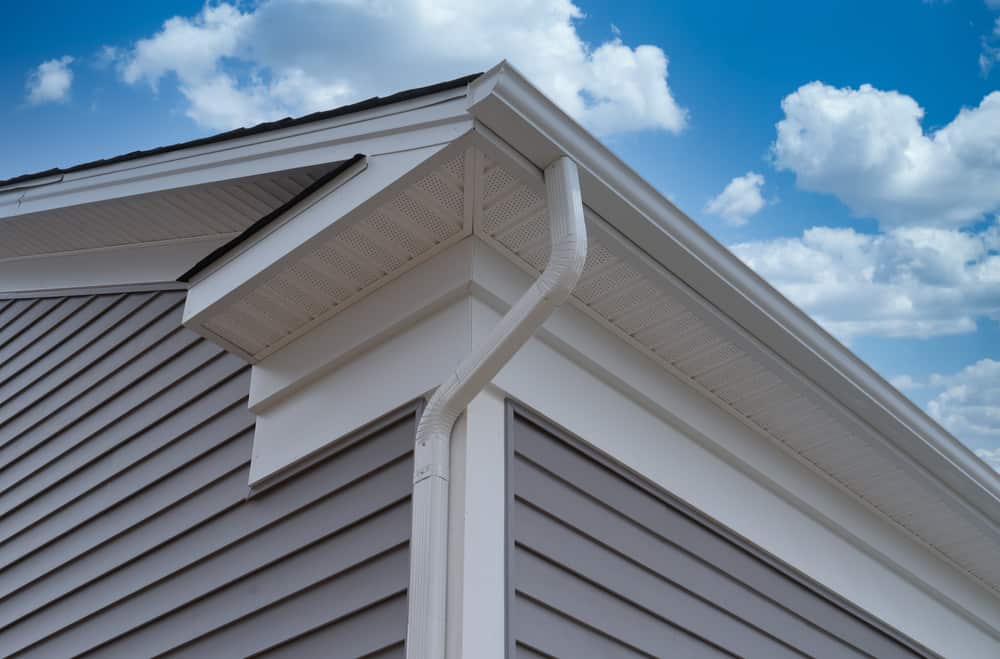Gutters are crucial for protecting your home foundation from erosion, the roof from leaks, and windows from rot, resulting from heavy rain and snow melting. Therefore, it is crucial to pick out the best possible material for gutters and protect your home.
Most homeowners have a dilemma deciding which one, vinyl vs. aluminum gutters, is a better and more reliable option. You should pay attention to crucial features, such as leak resistance, effortless installation, maintenance level, material strength, and price. Find all information available and choose wisely since gutters are a long-lasting investment.
Table of Contents
Vinyl Gutters
Vinyl gutters’ primary advantages are lightness, minimal maintenance, and affordability. However, this material releases harmful chemicals during the manufacturing process, making it an eco-unfriendly solution.
You can install these gutters in regions with a mild climate and coastal areas because vinyl is resistant to salt and high humidity.
Pros
- Gutters made of vinyl are lightweight and rust-resistant
- These gutters are easy to install and maintenance
- There is no need to paint them
- They are affordable
Cons
- Vinyl gutters are susceptible to extreme temperatures
- They have structural weakness and a short lifespan
- You can expect them to warp, crack, fade, and start leaking over time
Aluminum Gutters
Most Americans prefer gutters made of lightweight, sturdy, and durable aluminum. Once you install them, you should occasionally wash them and re-paint the surface to keep the metal shiny and beautiful.
They are ideal for regions with harsh weather conditions, including heavy rain, strong winds, and storms. Avoid installing these gutters if you live near rivers or seaside since the salt and high humidity shorten this metal’s lifespan.
Pros
- Aluminum gutters are sturdy, durable, and long-lasting
- You have wide color choices at your disposal
- Aluminum is recyclable, making these gutters an environmentally friendly option
- These gutters are easy to find, easy to handle, and easy to maintain
Cons
- Gutters made of aluminum are tough to install and repair, requiring hiring a professional
- This metal quickly dents and its color fades or becomes yellowish
- Aluminum gutters have a high initial cost
Vinyl vs. Aluminum Gutters
Both gutter types, vinyl and aluminum, are represented in the USA, depending on the region, average weather conditions, roof design, and material price. Experts estimate that about 70% of American homes have aluminum gutters, while the rest of 30% is reserved for products made of one of the other materials, including vinyl.
Knowing your needs is crucial once you decide to buy gutters. Even though most experts agree that aluminum ones are more effective, you still have the right to choose based on each material’s features.
Vinyl vs. aluminum gutters |
||
| Features | Aluminum gutters | Vinyl gutters |
| Weight | A bit heavy and thick | Lightweight |
| Colors | Array of colors; paintable | Only white and brown (rarely in other shades); customized colors are still expensive |
| Durability | Rust resistant; can withstand ice and snow, but is prone to damage caused by excessive moisture and salt | Rust resistant; susceptible to damage under extreme temperature changes |
| Design | Seamed or seamless | Seamed or sectional |
| Installation | Tough to install | Easy to install |
| Lifespan | 20 to 30 years | 8 to 20 years |
| Eco-friendliness | Recyclable, eco-friendly | Eco-unfriendly |
| Price | $8.50 to $15 per linear foot, including labor
Overall installation costs are $1,900 to 2,800 on average |
$5 to $12 per linear foot, including labor
Overall installation costs are $1,200 to $1,700 on average |
Materials
Both materials are lightweight, but aluminum is heavier, sturdier, and thicker than vinyl, resulting in a longer lifespan. Metal also withstands extreme heat and cold better, unlike vinyl which becomes brittle when exposed to low temperatures and tends to sag on heat.
On the other hand, the hard impact causes dents in aluminum. Even though this metal is less susceptible to rust than others, it is better to paint it on time.
Design
Unlike vinyl gutters, those made of aluminum are often seamless. This design looks beautiful and is a practical solution to prevent leaking.
On the other hand, pre-cut vinyl gutters never come in too many design options. They are always seamed and prone to leaking over the years. Sectional gutter systems are typically over 20 feet (6 m) long, and you can cut them in any desired size.
Color
If you choose vinyl gutters, you don’t need to paint them. Unfortunately, you can typically find white and brown standard models. In the past, customized colors were expensive, but many manufacturers include other vinyl gutters color options nowadays.
You can still have a problem with lighter-colored painted vinyl gutters that become yellowish after a while. On the other hand, darker vinyl will start fading in direct sunlight.
Aluminum gutters are paintable and come in a wide range of colors. The best thing is that you can re-paint them whenever you want in any possible color. Most experts recommend using acrylic paint, while UV protectants can increase your gutters’ lifespan.
Performance
Since vinyl gutters are lightweight, they are unsuitable for regions with snow, strong winds, and heavy rain. You can expect them to bend, crack, and leak in such weather conditions. However, they are an excellent option for dry climates.
Aluminum gutters are resistant to adverse weather conditions and hold more water than those made of vinyl. However, this gutter type is not recommended for coastal regions because aluminum is prone to fast deterioration in contact with high moisture and salt.
Remember that aluminum gutters have a longer lifespan when you install thick enough models and paint them regularly.
Durability
Aluminum gutter lifespan is approximately 20 to 30 years regardless of weather conditions. However, adequate maintenance can prolong that period to almost 50 years.
Vinyl gutters are resistant to rust and typically last up to 20 years in mild climates. Unfortunately, their lifespan is about 8 to 10 years in cold regions with a lot of rain and wind.
Installation
Since vinyl gutters are more lightweight than aluminum ones, you can handle them more easily. With some skill and proper equipment, you can install them yourself, but be aware that they have more seams.
On the other hand, the aluminum gutter installation will depend on the type you order. You can buy a seamed version if you enjoy DIY projects, but you need to hire a professional when choosing custom-made seamless aluminum gutters.
Maintenance
Vinyl gutters are effortless to maintain. It is necessary to wash them occasionally, but there is no need for painting or coating them. It is always better to paint aluminum gutters to prolong their lifespan and re-paint them when fading.
Repairing
Vinyl gutters are almost impossible to repair, and you need to replace every cracked piece. Seamless aluminum gutters come with fewer pieces screwed together, and their separation is pretty unlikely.
Since aluminum is prone to dents, you can repair them somewhat by hammering them out, but restoring the surface to its original shape is impossible.
Eco-friendly option
Aluminum is recyclable material, making gutters made of this metal eco-friendly. Vinyl releases toxic chemicals during production and is considered harmful to the environment.
Popularity
About 70% of all gutters installed in the US are made of aluminum, making this option the most popular among homeowners.
Price
Price is one of the deciding factors when buying gutters since homeowners often look for cost-effective options. The average gutter system installation costs depend on a few factors, including:
- Your home square footage
- Number of floors
- Gutter type and style
- Accompanying gutter system parts
- Labor rates in your area
Both vinyl and aluminum gutters are affordable, but those made of vinyl are less expensive. Even though its upfront costs are lower, it has a shorter life span than aluminum, and you will probably pay more in the long run.
On the other hand, you should initially pay more for aluminum gutters, but they will pay off after a while. Plus, installation costs are reasonable, and you can expect them to be an excellent return on investment.
Vinyl gutters price is $5 to $12 per linear foot, including accompanied pieces and labor:
- Vinyl gutters are approximately $3 to $5 per linear foot
- Labor is $2 to $4 per linear foot on average
- Vinyl downspouts cost about $24 to $45 per unit
- Vinyl gutter guards’ price is $4 to $7 per linear foot
- Vinyl end caps are $5 to $8.50 per unit
All things considered, the average vinyl gutter installation costs range from $1,200 to $1,700.
Aluminum gutters are expensive, depending on the gutters’ style and metal thickness. A current aluminum gutter price is from $9 to $15 per linear foot, labor included. In most cases, this option costs $1,900 to 2,800 on average.
As you can see, the upfront vinyl gutter price is 15% to 20% less than those made of aluminum when you hire a professional to do the job. A DIY project will cost you an incredible 70% less.
Summary
Even though both options have advantages and downsides, most experts recommend aluminum gutters, and homeowners decide to install them.
This material is affordable, reliable, eco-friendly, and durable, making it a practical choice. The apparent cons of aluminum gutters is an installation that requires professional help, but they are worth the extra cost.

